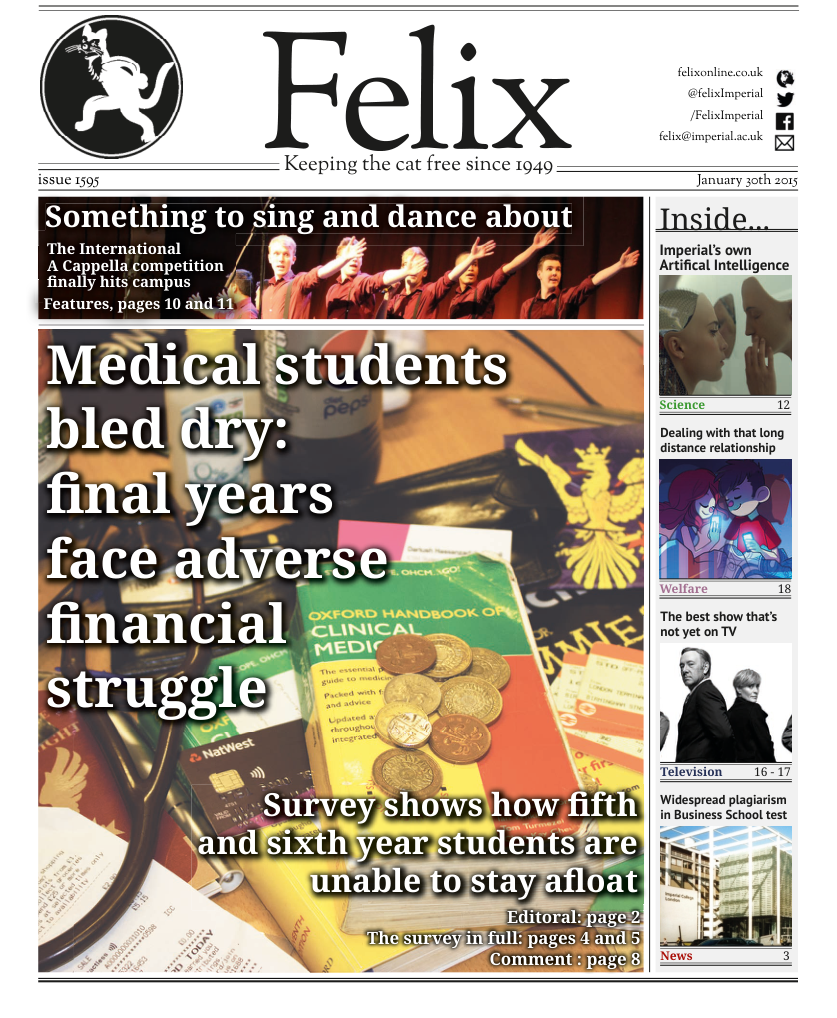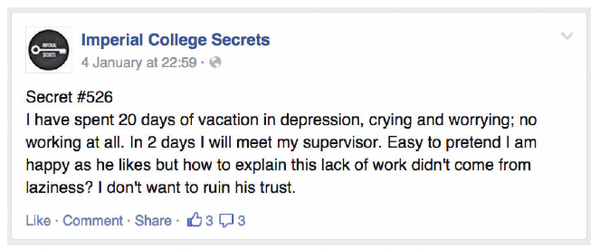It’s time to tackle medics’ money problems
Jennifer Watson asks whether the College offer enough support

Imperial College isn’t well known for their regard for the wellbeing of undergraduate students; and there are many at Charing Cross who would argue that College high-ups give even less of a toss about medics. Either way, sitting back and watching students, medic or otherwise, fall into such severe financial difficulty, as illustrated in the recent survey, is an abandonment of their duty of care. It is not a new phenomenon that medics take a massive cut in funding after fourth year. As far as I can tell, this is the first time anyone has tried to tackle the monetary troubles faced by fifth and final year medics.
Medics’ final two years are tough and vitally important; we start metamorphosing into doctors. Not only are we in hospitals pretty much all day every day, we are also expected to study at any available opportunity. There is a huge amount to learn and failing to do so could lead to much more than poor grades, but has potential to impact on our competency after we qualify.
A significant number of us are struggling financially to a point where we have no option but to work several evenings a week. Some students expressed guilt over sometimes leaving hospitals early to get to work on time, others angst over the lack of time they have to study as a result of work commitments. Although some doctors are sympathetic to this, there are plenty of consultants and registrars who are less understanding. The college is also deeply unsupportive.
I ran into difficulties during paediatrics when applying for residency placements (catapulted to distant hospitals, often outside of London for 2 weeks). I emailed the course administrator explaining that if I were sent away from London I would be unable to get to tutoring jobs and thus be unable to make rent. I got a snide response detailing College’s student employment policy. It was clear that I was expected to prioritise our academic work. Fair enough – but if the entirety of my funding amounts to less than basic living expenses, I don’t have a choice. Don’t leave me with insufficient student grants and loans and get snippy when I need to work to keep a roof over my head.
I was already aware of the financial difficulties facing fifth and final years before I was elected to ICSMSU, however as soon as survey results started rolling in I saw it was worse than I could imagine. For many of my peers, it came as a shock, leaving some students tied to rental contracts that they simply couldn’t afford. The survey found that 46.4% of students were unable to cover their rent, despite many working alongside their studies. Surely it is unacceptable that one of the wealthiest institutions in the world is allowing this to happen?
It has been suggested that students supported by their parents are at a massive academic advantage by having time to study and maintain a work-life balance. The current system was built for the historic rich-kid demographic of medical school. Now that more medics come from standard middle class backgrounds funding bodies need to adapt; we can’t all turn to the Bank of Mum and Dad. Many students receiving parental support describe strained family relationships and intense feelings of guilt for doing so.
I was angrier than ever reading about the impact to students’ wellbeing. Students are forced to put their studies, relationships and physical health at risk in order to keep their heads above water; some students’ diets depend on how much money they have. Most shockingly, there are some students who essentially starve themselves, going so far as to eat one meal a day just to make ends meet. Mental health comes into play as well. It’s well known that mental illnesses like depression and anxiety disorders are a pertinent problem in elite universities; the prevalence of anxiety and depression is even higher among medics. This is apparently being compounded by financial anxieties; some students have been prescribed medication (anti-anxiety and anti-depressant drugs) as a result of their financial concerns. It doesn’t take a genius to realise that all of this is bound to impact students’ grades.
I am certainly not the only person to find this abominable. Consensus among ICSM students is that of anger and a deep dissatisfaction that they have, as one person put it, been “so greatly let down by The System“. The Faculty of Medicine has also got behind me and is looking into ways to keep the cost of living down for students, which will hopefully go some way to alleviating the situation.
All I can do with what I have so far is try to persuade Imperial to restructure its bursary scheme and provide more support to senior medics. Unfortunately this isn’t an adequate solution. An extension of the survey has revealed that the problem is endemic in London medical schools. Furthermore, anecdotal evidence suggests it is nationwide, implying that the cost of living in London is not the real core of the issue. Addressing this at Imperial leaves many thousands of medics across the capital and the rest of the country stuck in the same situation.
For me, the ultimate goal is top down reform within Student Finance and the NHS. Student Finance may have concerns about students failing to repay their loans. Let’s be honest here, medics mostly have a guaranteed job for life. There is very little danger of them failing to pay off student loans. Imperial contains some of the world’s brightest minds and is an incredibly wealthy institution, and yet medics can’t afford basic living costs while exercising our right to an education. Any such system is flawed.
Medics and students in other healthcare disciplines commit their entire working lives and make extensive sacrifices to providing an indispensable public service, and yet many are forced into illness and borderline poverty before they can even begin to give back to society. Is it just me, or is there an irony in that?









